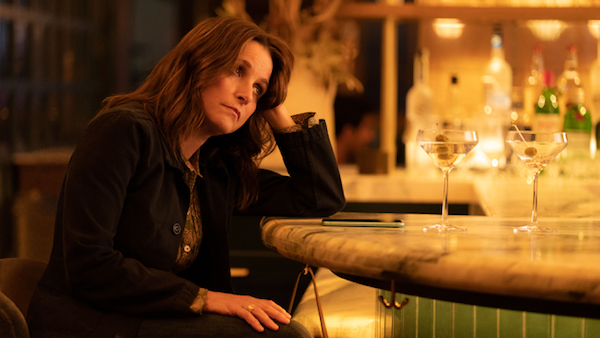Movie review by Greg Carlson
Writer-director Nicole Holofcener leans in – all the way in – to the sturdy milieu of the well-heeled, narcissist-inhabited, New York-based comedy landscape dominated for so many decades by the now fading/faded Woody Allen. A24 presents Holofcener’s “You Hurt My Feelings” as a May theatrical release following its world premiere at the Sundance Film Festival. In the film, protagonist Beth (Julia Louis-Dreyfus) is a moderately successful writer second-guessing her current book, a fiction follow-up to her memoir, which explored the “verbal abuse” she suffered at the hands of her father. Beth’s husband Don (Tobias Menzies) treats clients as a therapist, although he worries he might not be any good at it. Grown son Eliot (Owen Teague) manages a marijuana dispensary but hopes to complete his own long-gestating writing project.
The blissful marriage, which Holofcener deliberately intensifies with an array of affectionate little gestures that humorously irritate Eliot if not the viewer, is built on a foundation of unwavering love and trust. Or so Beth naively assumes. While out shopping with sister Sarah (Michaela Watkins) and brother-in-law Mark (Arian Moayed), Beth overhears Don criticize and dismiss her new novel. Because her husband has provided none of this kind of negative critique to her face, Beth is devastated, gutted, and very nearly destroyed. She wants to throw up. Her feelings, as most assuredly indicated by the title of the movie, have been deeply hurt.
Holofcener, who continues to demonstrate her gift for deceptively natural dialogue, poses a number of instantly recognizable questions. Do we all bend and shape the truth to avoid conflict with those closest to us? Do we all contemplate the limits of our own vocational and avocational skill? Wouldn’t most of us choose warm affirmation over radical honesty, especially when delivered by a loved one? To some extent, the principal characters in “You Hurt My Feelings” are creative artists, or at least use creative impulses to make a living. Interior decorator Sarah and actor Mark are just as vulnerable as Beth and Don to rejection.
As an analyst, Don is arguably the least traditional “creator” of the quartet, but Holofcener shares some of the movie’s most intriguing exchanges inside the “safe space” of his office. In the film’s most bracing running gag, real-life married couple Amber Tamblyn and David Cross openly unleash blunt and painful invective that the considerate and caring Beth and Don would never entertain. The comic juxtaposition of lovers versus fighters reminds us of the differences between those who seem to thrive on conflict and partners who unfailingly cheer and support each other.
Some critics have called out the privilege and first-world problems at the heart of “You Hurt My Feelings” as some kind of deficiency or shortcoming, but the title alone should offer the first clue that the filmmaker has a handle on irony. Louis-Dreyfus, allowed here to explore comic and dramatic dimensions of performance not aligned with Elaine Benes, Christine Campbell or Selina Meyer, worked with Holofcener (and the late James Gandolfini) a decade ago on “Enough Said.” Hopefully, we won’t need to wait another ten years before the next collaboration.
